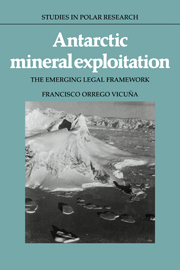Book contents
- Frontmatter
- Contents
- Preface
- Acknowledgement
- Abbreviations
- Part I The international legal framework of Antarctic co-operation and the development of resources
- Part II Alternative approaches to the conservation and development of Antarctic minerals: the process of internal accommodation
- 5 Basic elements of the regime for the exploration and exploitation of Antarctic mineral resources
- 6 Special policies pursued by the mineral resources regime
- 7 The distribution of powers within the regime: models and alternatives for accommodation
- 8 The institutional system of the mineral regime
- Part III Issues and options relating to the external accommodation
- Appendix 1 The Antarctic Treaty
- Appendix 2 Table of signatures and ratifications
- Table of Cases
- Table of Statutes and national legislation
- Table of Treaties
- Bibliography
- Index
8 - The institutional system of the mineral regime
Published online by Cambridge University Press: 04 November 2009
- Frontmatter
- Contents
- Preface
- Acknowledgement
- Abbreviations
- Part I The international legal framework of Antarctic co-operation and the development of resources
- Part II Alternative approaches to the conservation and development of Antarctic minerals: the process of internal accommodation
- 5 Basic elements of the regime for the exploration and exploitation of Antarctic mineral resources
- 6 Special policies pursued by the mineral resources regime
- 7 The distribution of powers within the regime: models and alternatives for accommodation
- 8 The institutional system of the mineral regime
- Part III Issues and options relating to the external accommodation
- Appendix 1 The Antarctic Treaty
- Appendix 2 Table of signatures and ratifications
- Table of Cases
- Table of Statutes and national legislation
- Table of Treaties
- Bibliography
- Index
Summary
Institutional development in the framework of the Antarctic Treaty system
The institutional approach followed by the Antarctic Treaty has been of a rather elemental nature. In spite of the fact that the academic and diplomatic debate that preceded this instrument had a strong institutional emphasis, the negotiators of the Treaty opted for the machinery of Consultative Meetings, i.e. for the Consultative Parties to meet periodically on a rotational basis, without the support of permanent organs. This decision was certainly closely related to the question of the disputed claims of sovereignty since certain countries feared that any form of institutionalization might, as a concomitant, signify a process of internationalization that would affect their claims or rights.
Within this approach, the central role in the management of the Antarctic Treaty system devolves on the Consultative Parties, whether founder members or whether admitted subsequently. Even though the latter, in accordance with the Treaty, participate only during such time as they demontrate an interest in Antarctica by conducting substantial scientific research there, the exercise of rights is identical for all the Consultative Parties. Furthermore, there is little likelihood in practice that a State that has acceded as a Consultative Party would subsequently be deprived of that status.
- Type
- Chapter
- Information
- Antarctic Mineral ExploitationThe Emerging Legal Framework, pp. 349 - 408Publisher: Cambridge University PressPrint publication year: 1988



